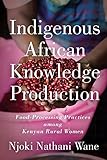Indigenous African Knowledge Production : Food-Processing Practices among Kenyan Rural Women / Njoki Nathani-Wane.
Material type: TextPublisher: Toronto : University of Toronto Press, [2014]Copyright date: ©2014Description: 1 online resource (144 p.) : 1 MapContent type:
TextPublisher: Toronto : University of Toronto Press, [2014]Copyright date: ©2014Description: 1 online resource (144 p.) : 1 MapContent type: - 9781442648142
- 9781442670037
- 305.48896391067626
- online - DeGruyter
| Item type | Current library | Call number | URL | Status | Notes | Barcode | |
|---|---|---|---|---|---|---|---|
 eBook
eBook
|
Biblioteca "Angelicum" Pont. Univ. S.Tommaso d'Aquino Nuvola online | online - DeGruyter (Browse shelf(Opens below)) | Online access | Not for loan (Accesso limitato) | Accesso per gli utenti autorizzati / Access for authorized users | (dgr)9781442670037 |
Browsing Biblioteca "Angelicum" Pont. Univ. S.Tommaso d'Aquino shelves, Shelving location: Nuvola online Close shelf browser (Hides shelf browser)

|

|

|

|

|

|

|
||
| online - DeGruyter Marshall McLuhan and Northrop Frye : Apocalypse and Alchemy / | online - DeGruyter John Paizs's Crime Wave / | online - DeGruyter Hockey, PQ : Canada's Game in Quebec's Popular Culture / | online - DeGruyter Indigenous African Knowledge Production : Food-Processing Practices among Kenyan Rural Women / | online - DeGruyter Essays in the History of Canadian Law, Volume XI : Quebec and the Canadas / | online - DeGruyter Transnational and Immigrant Entrepreneurship in a Globalized World / | online - DeGruyter Contesting Aging and Loss / |
Frontmatter -- Contents -- Foreword -- Acknowledgments -- Introduction -- 1. Food Processing: Embu Women and Indigenous Knowledges -- 2. Kenya: The Land, the People, and the Socio-political Economy -- 3. The Everyday Experiences of Embu Women -- 4. Food Preservation and Change -- 5. Gender Relations, Decision Making, and Food Preferences -- 6. Indigenous Technology and the Influence of New Innovations -- 7. Removing the Margins: Including Indigenous Women’s Voices in Knowledge Production -- 8. Contesting Knowledge: Some Concluding Thoughts -- Notes -- References -- Index
restricted access online access with authorization star
http://purl.org/coar/access_right/c_16ec
TAmong the rural Embu people of Eastern Kenya, teaching and learning are not purely institutional activities. Instead, knowledge is passed from generation to generation alongside the most mundane activities. In Indigenous African Knowledge Production, Njoki Nathani Wane uses food-processing practices – preparing, preserving, cooking, and serving – as an entry point into the indigenous knowledge of the Embu and the role that rural Embu women play in creating and transmitting it.Using personal narratives collected during several years of field research in Kenya, Wane demonstrates how Embu women use proverbs, fables, and folktales to preserve and communicate their world-view, knowledge, and cultural norms. She shows how this process preserves Indigenous knowledge devalued by the colonial and post-colonial educational systems, as well as the gendered dimension of the transmission process.Wane’s book will be useful not just to those studying development and education in Africa, but also to all those interested in questions of how to preserve and recover local cultural knowledge.
Mode of access: Internet via World Wide Web.
In English.
Description based on online resource; title from PDF title page (publisher's Web site, viewed 01. Dez 2023)


